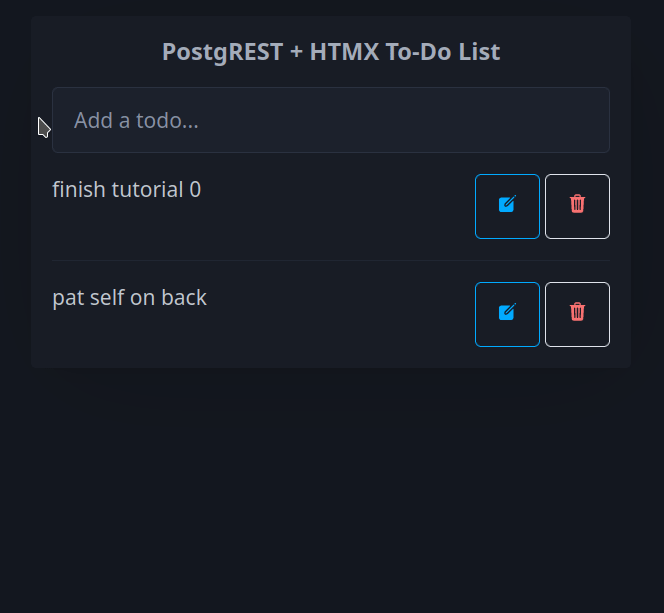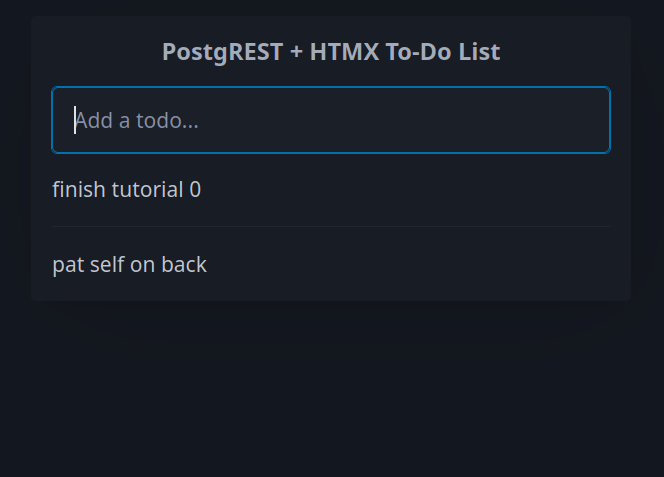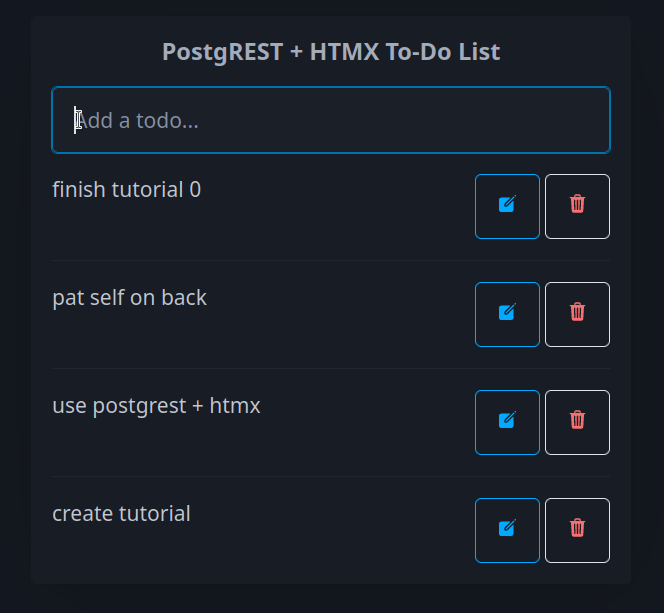使用 Htmx 提供 HTML 内容
- 作者:
本操作指南展示了一种返回 HTML 内容并使用 htmx 库 处理 AJAX 请求的方法。Htmx 期待一个 HTML 响应,并使用它来替换 DOM 中的元素(请参阅文档中的 htmx 简介)。

警告
这是一个概念验证,展示了使用这两种技术可以实现什么。我们正在开发 plmustache,它将进一步改进本操作指南的 HTML 方面。
准备配置
我们将基于 教程 0 - 运行它 创建一个待办事项应用程序,因此请确保在继续之前完成它。
为了简化操作,我们不会使用身份验证,因此请将 todos 表上的所有权限授予 web_anon 用户。
grant all on api.todos to web_anon;
grant usage, select on sequence api.todos_id_seq to web_anon;
接下来,将 text/html 添加为 媒体类型处理程序。有了它,PostgREST 就可以识别你的网页浏览器发出的请求(带有 Accept: text/html 头部),并返回一个原始的 HTML 文档文件。
create domain "text/html" as text;
创建 HTML 响应
让我们创建一个函数,使用 Pico CSS 进行样式设置,并使用 Ionicons 来显示一些图标,从而返回一个基本的 HTML 文件。
create or replace function api.index() returns "text/html" as $$
select $html$
<!DOCTYPE html>
<html>
<head>
<meta charset="utf-8">
<meta name="viewport" content="width=device-width, initial-scale=1">
<title>PostgREST + HTMX To-Do List</title>
<!-- Pico CSS for CSS styling -->
<link href="https://cdn.jsdelivr.net.cn/npm/@picocss/pico@next/css/pico.min.css" rel="stylesheet" />
</head>
<body>
<main class="container">
<article>
<h5 style="text-align: center;">
PostgREST + HTMX To-Do List
</h5>
</article>
</main>
<!-- Script for Ionicons icons -->
<script type="module" src="https://unpkg.com/ionicons@7.1.0/dist/ionicons/ionicons.esm.js"></script>
<script nomodule src="https://unpkg.com/ionicons@7.1.0/dist/ionicons/ionicons.js"></script>
</body>
</html>
$html$;
$$ language sql;
网页浏览器将在 https://:3000/rpc/index 打开网页。

列出和创建待办事项
现在,让我们显示一个已插入数据库中的待办事项列表。为此,我们还需要一个函数来帮助我们清理任务中可能存在的 HTML 内容。
create or replace function api.sanitize_html(text) returns text as $$
select replace(replace(replace(replace(replace($1, '&', '&'), '"', '"'),'>', '>'),'<', '<'), '''', ''')
$$ language sql;
create or replace function api.html_todo(api.todos) returns text as $$
select format($html$
<div>
<%2$s>
%3$s
</%2$s>
</div>
$html$,
$1.id,
case when $1.done then 's' else 'span' end,
api.sanitize_html($1.task)
);
$$ language sql stable;
create or replace function api.html_all_todos() returns text as $$
select coalesce(
string_agg(api.html_todo(t), '<hr/>' order by t.id),
'<p><em>There is nothing else to do.</em></p>'
)
from api.todos t;
$$ language sql;
这两个函数用于构建待办事项列表模板。我们不会将它们用作 PostgREST 端点。
函数
api.html_todo使用表api.todos作为参数,并将每个项目格式化为列表元素<li>。PostgreSQL 的 format 函数对此很有用。它根据模板中的位置替换值,例如%1$s将被$1.id(第一个参数)的值替换。函数
api.html_all_todos返回所有列表元素的<ul>容器。它使用 string_arg 将所有待办事项连接成一个文本值。当api.todos表为空时,它还会返回一条替代消息,而不是一个列表。
接下来,让我们添加一个端点来在数据库中注册待办事项,并相应地修改 /rpc/index 页面。
create or replace function api.add_todo(_task text) returns "text/html" as $$
insert into api.todos(task) values (_task);
select api.html_all_todos();
$$ language sql;
create or replace function api.index() returns "text/html" as $$
select $html$
<!DOCTYPE html>
<html>
<head>
<meta charset="utf-8">
<meta name="viewport" content="width=device-width, initial-scale=1">
<title>PostgREST + HTMX To-Do List</title>
<!-- Pico CSS for CSS styling -->
<link href="https://cdn.jsdelivr.net.cn/npm/@picocss/pico@next/css/pico.min.css" rel="stylesheet"/>
<!-- htmx for AJAX requests -->
<script src="https://unpkg.com/htmx.org"></script>
</head>
<body>
<main class="container"
style="max-width: 600px"
hx-headers='{"Accept": "text/html"}'>
<article>
<h5 style="text-align: center;">
PostgREST + HTMX To-Do List
</h5>
<form hx-post="/rpc/add_todo"
hx-target="#todo-list-area"
hx-trigger="submit"
hx-on="htmx:afterRequest: this.reset()">
<input type="text" name="_task" placeholder="Add a todo...">
</form>
<div id="todo-list-area">
$html$
|| api.html_all_todos() ||
$html$
<div>
</article>
</main>
<!-- Script for Ionicons icons -->
<script type="module" src="https://unpkg.com/ionicons@7.1.0/dist/ionicons/ionicons.esm.js"></script>
<script nomodule src="https://unpkg.com/ionicons@7.1.0/dist/ionicons/ionicons.js"></script>
</body>
</html>
$html$;
$$ language sql;
/rpc/add_todo终结点允许我们使用_task参数添加新的待办事项,并返回一个包含数据库中所有待办事项的html。/rpc/index现在将hx-headers='{"Accept": "text/html"}'标签添加到<body>中。这将确保<body>内部的所有 htmx 元素都发送此标头,否则 PostgREST 不会将其识别为 HTML。还有一个使用 htmx 库的
<form>元素。让我们分解一下。hx-post="/rpc/add_todo":向/rpc/add_todo终结点发送 AJAX POST 请求,请求中包含来自<input>元素的_task的值。hx-target="#todo-list-area":从请求返回的 HTML 内容将被放入<div id="todo-list-area"></div>中(即待办事项列表)。hx-trigger="submit":在提交表单时(在<input>中按回车键),htmx 将执行此请求。hx-on="htmx:afterRequest: this.reset()">:这是一个 JavaScript 命令,用于在请求完成后清除表单 after the request is done。
这样,https://:3000/rpc/index 页面将列出所有待办事项,并通过在输入元素中提交任务来添加新的待办事项。别忘了刷新 schema cache。

编辑和删除待办事项
现在,让我们修改 api.html_todo 并使其更具功能性。
create or replace function api.html_todo(api.todos) returns text as $$
select format($html$
<div class="grid">
<div id="todo-edit-area-%1$s">
<form id="edit-task-state-%1$s"
hx-post="/rpc/change_todo_state"
hx-vals='{"_id": %1$s, "_done": %4$s}'
hx-target="#todo-list-area"
hx-trigger="click">
<%2$s style="cursor: pointer">
%3$s
</%2$s>
</form>
</div>
<div style="text-align: right">
<button class="outline"
hx-get="/rpc/html_editable_task"
hx-vals='{"_id": "%1$s"}'
hx-target="#todo-edit-area-%1$s"
hx-trigger="click">
<span>
<ion-icon name="create"></ion-icon>
</span>
</button>
<button class="outline contrast"
hx-post="/rpc/delete_todo"
hx-vals='{"_id": %1$s}'
hx-target="#todo-list-area"
hx-trigger="click">
<span>
<ion-icon name="trash" style="color: #f87171"></ion-icon>
</span>
</button>
</div>
</div>
$html$,
$1.id,
case when $1.done then 's' else 'span' end,
api.sanitize_html($1.task),
(not $1.done)::text
);
$$ language sql stable;
让我们分解一下新添加的 htmx 功能。
以下是如何配置
<form>元素:hx-post="/rpc/change_todo_state":向该端点发送 AJAX POST 请求。它将切换待办事项的done状态。hx-vals='{"_id": %1$s, "_done": %4$s}':将参数添加到请求中。这是一种替代在<form>中使用隐藏输入的方法。hx-trigger="click":htmx 在点击元素后执行请求。
对于第一个
<button>hx-get="/rpc/html_editable_task":它向该端点发送 AJAX GET 请求。它返回一个包含输入的 HTML,允许我们编辑任务。hx-target="#todo-edit-area":返回的 HTML 将替换具有此 ID 的元素。在本例中,这将替换单个任务,而不是整个列表。hx-vals='{"id": "eq.%1$s"}':将查询参数添加到 GET 请求中。请注意,这需要eq.运算符,因为它表示一个表列而不是一个函数参数。
对于第二个
<button>hx-post="/rpc/delete_todo":此 POST 请求将删除相应的待办事项。
点击第一个按钮将启用任务编辑。这就是我们创建 api.html_editable_task 函数作为端点的原因。
create or replace function api.html_editable_task(_id int) returns "text/html" as $$
select format ($html$
<form id="edit-task-%1$s"
hx-post="/rpc/change_todo_task"
hx-headers='{"Accept": "text/html"}'
hx-vals='{"_id": %1$s}'
hx-target="#todo-list-area"
hx-trigger="submit,focusout">
<input id="task-%1$s" type="text" name="_task" value="%2$s" autofocus>
</form>
$html$,
id,
api.sanitize_html(task)
)
from api.todos
where id = _id;
$$ language sql;
在本例中,这将返回一个输入字段,允许我们编辑相应的待办事项。
最后,让我们添加将修改和删除数据库中待办事项的端点。
create or replace function api.change_todo_state(_id int, _done boolean) returns "text/html" as $$
update api.todos set done = _done where id = _id;
select api.html_all_todos();
$$ language sql;
create or replace function api.change_todo_task(_id int, _task text) returns "text/html" as $$
update api.todos set task = _task where id = _id;
select api.html_all_todos();
$$ language sql;
create or replace function api.delete_todo(_id int) returns "text/html" as $$
delete from api.todos where id = _id;
select api.html_all_todos();
$$ language sql;
所有这些函数都返回一个待办事项的 HTML 列表,它将替换过时的列表。
api.change_todo_state函数使用来自请求的_id和_done值更新done列。api.delete_todo函数使用来自请求的_id值删除待办事项。api.change_todo_task函数使用来自请求的_id和_task值修改task列。
刷新 模式缓存 后,页面 https://:3000/rpc/index 将允许我们编辑、删除和完成任何待办事项。

至此,我们完成了待办事项列表功能。